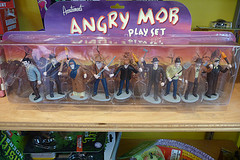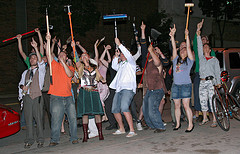Since some time I am training young developers. I meet with different teams and we discuss topics like
Pair Programming or I run hands-on workshops in the
Coding Dojo format. Occasionally I pair program with single team members on difficult tasks as mentoring on steroids.
The first session
Last November one team I work with grew tired of Coding Dojo examples and wanted to work on real code while keeping the good atmosphere of our sessions. I envisioned sort-of a dojo in Randori style with everybody of the team pairing with me one after another. It ended with me being busy driving and all others navigating in different directions at the same time. Additionally, as teacher, I had to think about the proper action for the code and discuss the different proposals of navigators. It was difficult and showed many opportunities for improvement.
Enter Mob Programming

At the same time I learned about
Mob Programming. Mob Programming is defined as
all the brilliant people working at the same time, in the same space, at the same computer, on the same thing. That means that most of the mob's work is done sitting together in a group work area. All the necessary skills are present together in the same room, so there is no waiting time. If you have never heard of it, I recommend watching this
presentation by Woody Zuill about Mob Programming, presented at the Oredev conference last year. Woody's team is using this technique since some time for all production work.
My Sessions
Inspired by Mob Programming I applied some of its concepts to my sessions. For example I never drive and I also do not navigate. Instead I try to meta-navigate the team of navigators. (Or sometimes I simply dominate everybody and tell the driver exactly which keyboard short-cuts to type. ;-) In the following sessions we refactored some code and created unit tests. All these sessions worked out well. Now, after running more than ten Mob Programming sessions with various teams during the last year, here are some things I noticed:
Communication
Mob Programming enables communication. In one of the first sessions, the architect of the team saw something in the source he did not like. He mentioned it to be an architecture violation but the other team members did not know this aspect of the architecture. It was amazing to see them talk. Although being on the same team they had not talked about it before. It is known that regular pair programming spreads the knowledge throughout the team and Mob Programming does even more so.
 Participation
Participation
"Mob learning" differs from regular "mob work". Some people like learning sessions less than "the real thing" Also as in any team and any team activity some are more interested in the session than others. But usually participants are engaged, probably due the good communication. One major factor for active participation is the team size. Sessions with too many people do not work out well. Larger groups split into subgroups with their own agendas. I recommend group sizes of ten or less people.
The teams I work with are mixed teams with members of different experience and skill. It happens that some junior members cannot follow a high level discussion and zone out. I believe this is a symptom of the group needing more knowledge sharing and communication in general. I guess this does not happen to experienced "mobs" but I do not know. As moderator I try to get all people engaged and ask the seniors to explain the problem to the whole team because "the team needs to know". I also move forward very slowly so everyone is able to get along. This is even more important in the end of the session as people get tired and zone out more easily.
Exhaustion
Due to their active nature "mob sessions" are quite exhaustive. Ten minutes of break each 50 minutes of work help to keep people fresh. Also regular rooms run out of fresh air quickly, so I open windows as much as possible during these breaks. Most meeting rooms I have been to have the projector on the shorter side of the room, so almost all people have to sit with their heads turned. This is uncomfortable and tiring when sitting like that for several hours. While there are no dedicated work areas for mobs, internal training rooms are better because they are usually arranged like classrooms. But I have yet to find the perfect mob working area in the enterprise.
Topics
In my Mob Programming sessions I want to show the team certain techniques, e.g. splitting a large class. The session needs a defined, explicit goal and everybody needs to be clear about his or her expectations. The format works well for showing a work-flow from end to end. Also people like sessions with big structural changes, e.g. refactoring towards a pattern. On the other hand they do not like extracting small structures, discussing names and other clean code related activities. People do not feel progress there. This might be a drawback of working with real code, the urge to make progress is higher than in a dojo. Maybe these sessions are only appropriate after the participants have gained a certain level of competence by attending Coding Dojos. Even with successful mob sessions I mix in a Coding Dojo every third time at least. In the dojo people work on the details and practise the basics. In some way mob sessions are orthogonal to dojos and as such a great addition to our learning tools.
Driving

I rotate drivers every ten to 15 minutes, as proposed by the Mob Programming guide to keep people active. Usually there are participants who do not want to type. These include junior team members, who probably are afraid to get criticised in front of the team, and on many occasions female developers. If someone does not want to drive, I ask why, but till now did not get any clear answer. I guess some people do not want to type because they are slow. Once a senior guy refused but then did drive. He was horribly slow and used no short-cuts at all. He even did not find the rename refactoring in the Eclipse menu. It was embarrassing.
Moderation
These kind of work is more demanding for me than dojos or even theory sessions. I rehearse my theory presentations and experiment with the planned kata before a dojo, but it is impossible to prepare fully for such a mob session. I ask the team to send me the code we will work with a few days before and then work through it in detail. Knowing the code up front makes me feel more secure and saves time because I do not have to read the code during the session. Such a session is team work and I do not have a strict outline except the defined goal. In fact I can never be sure about the right thing to do because it is not my code. I have no idea about its requirements, history and constraints. This is stressful because as mentor I am asked for guidance which I might not be able to give. It happens that I have to say that I do not know, which is not a problem but still makes me feel that I failed.
Conclusion
I am facilitating Mob Programming sessions since almost a year with different teams in different companies. Some worked out great, some did not. Some were fun, some were just exhausting. Should you try it? Maybe, I do not know. Do I recommend it? No, I stick with Woody's style of "not recommending",
No I do not recommend it, I am just sharing because people have been asking about it. But I am genuinely interested in this mode of working and will continue to experiment with it. Unfortunately I never participated in a real session, working on production code. That would be another kind of experience. (Hint, hint! All you mobs out there, I am open for your invitations ;-)
 I regularly facilitate Coderetreats - as part of my work as Code Cop and for the local Software Crafters community. To support people organising events in other cities, I run Coderetreat facilitation trainings each year, especially in the months before the Global Day (of Coderetreat). Based on the feedback I get, e.g. Thanks for the training today! Very helpful! I see that these trainings are helpful for people who want to run Coderetreats. Often people ask the same questions, so I decided to record the most common questions. I will publish the recordings as I create them, so it is a podcast. (A podcast is an episodic series of digital audio files that a user can download in order to listen.)
I regularly facilitate Coderetreats - as part of my work as Code Cop and for the local Software Crafters community. To support people organising events in other cities, I run Coderetreat facilitation trainings each year, especially in the months before the Global Day (of Coderetreat). Based on the feedback I get, e.g. Thanks for the training today! Very helpful! I see that these trainings are helpful for people who want to run Coderetreats. Often people ask the same questions, so I decided to record the most common questions. I will publish the recordings as I create them, so it is a podcast. (A podcast is an episodic series of digital audio files that a user can download in order to listen.)

















